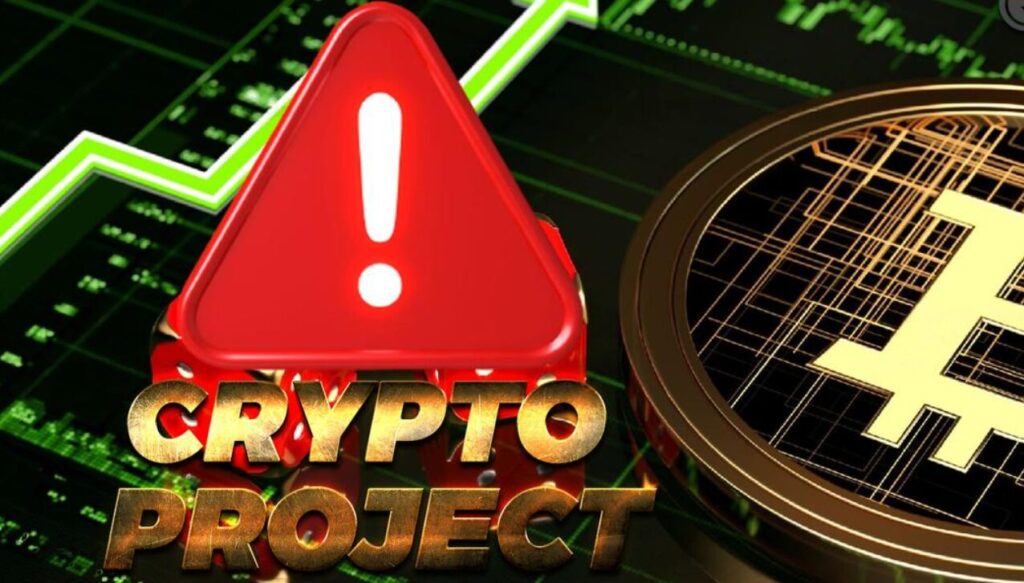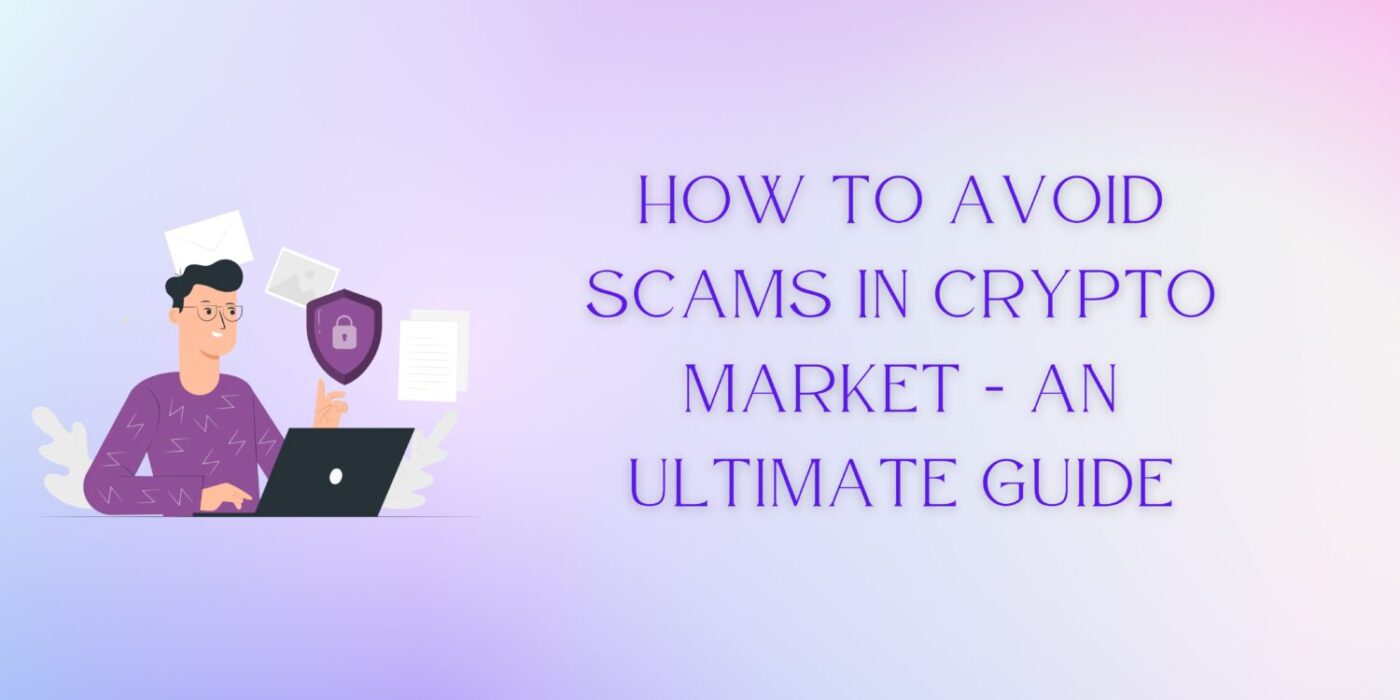The scope of these cryptocurrency frauds has raised concerns over the safety and security of the decentralized financial system. In light of this, it’s critical now more than ever to inform cryptocurrency users of the main dangers and warning signs. So let’s look into How to avoid scams in Crypto Market — An Ultimate Guide.
How to avoid scams in Crypto Market : Understanding the Landscape of Crypto Scams
Ransomware
Cybercriminals use malicious software to seize control of a victim’s device or account, encrypt it, and then demand payment in cryptocurrency for the decryption key. This is known as a crypto-ransomware scam.
Ransomware schemes pose a significant risk to individuals and organizations as they can cause data loss or breaches that can cause chaos.
Regrettably, con artists can access backups and encrypted accounts and data. In this situation, notify the authorities of the attack immediately and speak with cybersecurity specialists.


Phishing
Phishing is a classic scam technique to compromise crypto wallet keys and other login credentials. Scammers typically encourage their victims to log into their accounts via an official-looking email, but this is only a trap. If you need clarification on the sender, use link-checking tools and look up community evaluations of unidentified websites.


Blackmail
Blackmail scams occur when con artists get in touch with the target and threaten to release humiliating personal information—such as intimate images or videos—if their demands aren’t fulfilled.
Usually, if the victim initiates a cryptocurrency transfer immediately, these fraudsters guarantee to keep this information confidential. Scammers use threats and other forms of force to get victims to pay.
Scammers who use blackmail may fabricate stories about having sensitive data or media in their control. Thus, don’t send cryptocurrency transactions or respond to these emails or texts. Inform the FBI or other appropriate authorities about these frauds.
Fake applications
Scammers deceive Bitcoin investors by using download-only phony applications. Even if these fraudulent programs are found and eliminated, several companies will remain affected.
Investment Strategies
This is when you get a call from an unidentified “investment manager” who urges you to deposit cryptocurrency into their wallet in exchange for a significant return on your investment.
These con artists typically use sophisticated investment lingo to appear authentic and have professional-looking websites or applications.For this reason, it’s critical to use caution.


Impersonation
To steal people’s cryptocurrency, cryptocurrency fraudsters might pose as a well-known individual (like Elon Musk giving away bitcoin on Twitter), a government organization, or police enforcement. For instance, they may pose as the IRS to persuade the victim that their accounts are stopped as part of an inquiry. They could then demand payment in cryptocurrency to settle the dispute. They may demand money for a “fee” by claiming to speak on behalf of a big corporation like FedEx or Amazon.


Giveaways
When con artists pretend to be reputable cryptocurrency exchanges, companies, or well-known people to trick victims into transferring them bitcoin, this is known as a crypto giveaway scam. Usually, they make the victim swear that they would repay twice or three times the amount provided, but they disappear as soon as they get the money.
These scams are regularly advertised on social media sites like YouTube and Twitter, and they usually feature phony websites that mimic authentic businesses or exchanges.
Crypto pumps and dumps
When “high demand” is created to boost the value of a crypto asset fraudulently. Scammers typically use social media to generate excitement about NFT or cryptocurrencies. As a result, the price rises and becomes harder for investors to overlook. When the asset’s price reaches a certain level, the con artists “dump” or sell it immediately, driving down the asset’s value.


Fake Initial Coin Offerings (ICOs):
Con artists can fabricate and advertise ICOs that entice investors to purchase tokens for fictitious or nonexistent projects, only to disappear with the money.


Flash loans
Users of cryptocurrency loans can “borrow” money using flash loans without providing security, but there’s a catch: the money borrowed must be paid back in one transaction. Generally speaking, decentralized finance (DeFi) systems are used to enable these loans.
- Through a flash loan from a DeFi site, the fraudster obtains a large Bitcoin loan—often without having to provide security.
- The con artist uses the borrowed money to carry out operations such as arbitrage trading, manipulating the market, or taking advantage of flaws in DeFi smart contracts.
- The aim is to use these actions to your advantage in a single transaction in order to make a significant profit.
- Repayment of the borrowed monies must occur during the same transaction for flash loans. If the con artist is successful, they keep the profit after charging a charge for loan repayment.
- After that, the fraudster ends the transaction, often causing losses for token holders or the impacted DeFi platform.
How to avoid scams in Crypto Market : Essential strategies to keep safe
Stay Informed
The best defense against being a victim of a cryptocurrency scam is being an informed customer. Before purchasing any cryptocurrency, make sure you’ve looked at these factors:
- When were the coins made? Who made them?
- What is the technology that powers them?
- What sets them apart from other currency offers
- The number of coins being made
- What advantage do they have over other currencies
You may steer clear of investing in cryptocurrencies developed purely for the benefit of their creators’ wealth by ensuring you understand every detail of any cryptocurrency you are considering. Additionally, it would help if you investigated the websites you choose to purchase cryptocurrencies from to ensure they are reliable and safe for users.


Watch out for who you put your confidence in.
There’s a lot of terrible cryptocurrency advice out there, and you want to avoid falling for a scam by listening to someone you shouldn’t. It is not advisable to follow the advice of celebrities, users of social media or online forums, or anybody you need to learn well or who lacks reliable financial references.
Pay attention, in particular, to website URLs
You don’t want to put your information on any unsecure website or become a victim of a fake website. Therefore, before logging in, carefully check that the web URL is valid and begins with https (not http).
- Verify the security of your crypto wallet.
- If you plan to purchase virtual currencies and store them in a crypto wallet, ensure a reliable organization with a strong track record creates your digital wallet.
- You should refrain from logging into your wallet on public wifi and reveal your credentials to no one.
- Enrolling in two-factor authentication and password-protecting your devices are imperative to prevent unauthorized access to your wallet if your laptop or phone is stolen.
- Using numerous wallets and even offline cold storage devices might also be a smart option. This way, you won’t lose anything in the event of a breach.
Think about expanding your cryptocurrency exposure with more conventional assets.
Investing in ETFs that expose you to the cryptocurrency market or purchasing stocks in businesses whose success is often influenced by cryptocurrency performance are good ways to ensure you don’t become a victim of a scam using cryptocurrencies. These more conventional, regulated investments have far less room for fraud.


Benefit from two-factor authentication
Using multi-factor authentication ensures that a hacker cannot access your wallet or cryptocurrency trading account, even if they manage to get your login information. This is due to the requirement that a code be delivered to your phone or email before they are granted access. Furthermore, getting a code you didn’t request will indicate that someone has tried to access your account.


Take your time
Another important step in learning how to avoid scams in Crypto market. Scammers sometimes employ high-pressure techniques, such as making immediate promises of incentives or discounts, to get you to deposit your money. Before you invest any money, take your time and do your research.
Ignore cold calls
If someone calls you out of the blue offering to sell you a cryptocurrency investment opportunity, it’s likely a fraud. Never provide your personal information or money to someone who contacts you in this manner.


Download apps only from official stores
Finally, to learn how to avoid scams in Crypto Market you must downloading programs from these stores is safer than downloading them from other stores, even if phony software occasionally winds up there.
Conclusion
In today’s digital landscape, You must learn how to avoid scams in crypto market. Remaining vigilant, exercising caution, and prioritizing security measures are essential for protecting assets in the volatile world of cryptocurrency. Investors in cryptocurrencies may move through the market with greater confidence and resilience, even in the face of potential scams.
How do you recognize a cryptocurrency scammer?
Red flags and warning indicators, such as unsolicited offers, a lack of transparency, and pressure to make choices quickly, can help you identify cryptocurrency scammers. It would help if you also did your due diligence and extensive research before making cryptocurrency transactions or investments.
What is the penalty for cryptocurrency fraud?
Depending on the country, there are different punishments for crypto fraud. They might include fines, incarceration, asset seizure, and civil penalties.
If I fall for it, can I get my money back from a cryptocurrency scammer?
Regretfully, recovering money lost to cryptocurrency scams is usually tricky.







